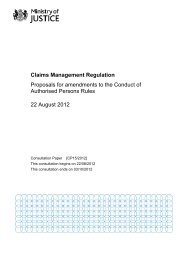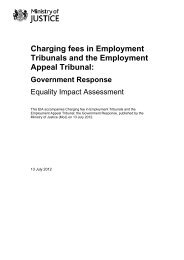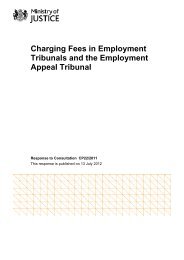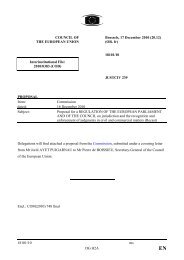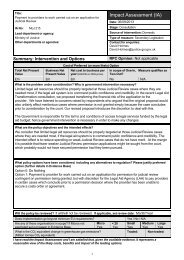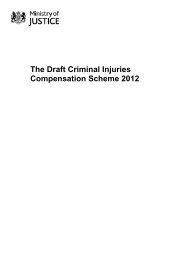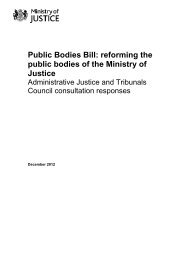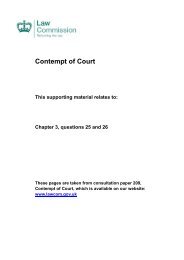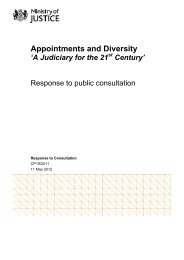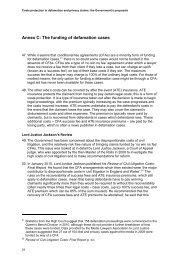Proposed reforms to attachment of earnings orders - Ministry of Justice
Proposed reforms to attachment of earnings orders - Ministry of Justice
Proposed reforms to attachment of earnings orders - Ministry of Justice
Create successful ePaper yourself
Turn your PDF publications into a flip-book with our unique Google optimized e-Paper software.
2. 19 There would also be ongoing costs from applying the s<strong>of</strong>tware. It is unclear whether these<br />
ongoing costs would be greater than the costs <strong>to</strong> employers <strong>of</strong> operating the current system.<br />
This might be possible in some cases. It has been assumed that employers would not be able <strong>to</strong><br />
charge for any increased costs which they might incur, i.e. that the fixed charge currently levied<br />
by employers per transaction would remain the same.<br />
Bailiffs<br />
2. 20 Bailiffs are likely <strong>to</strong> experience a reduction in business from the enforcement <strong>of</strong> AEOs. (This loss<br />
<strong>to</strong> bailiffs would be mirrored by the gain <strong>to</strong> deb<strong>to</strong>rs from no longer paying the related bailiff fees).<br />
2. 21 It is possible that bailiffs may engage in other enforcement activity relating <strong>to</strong> other types <strong>of</strong> case,<br />
or may engage in other lines <strong>of</strong> work. Bailiffs may incur one-<strong>of</strong>f costs as a result <strong>of</strong> adjusting <strong>to</strong><br />
any changing pattern <strong>of</strong> demand. Whether bailiffs are worse <strong>of</strong>f as a result <strong>of</strong> these proposals<br />
would depend upon how their work pr<strong>of</strong>ile changes. It has been assumed in this Impact<br />
Assessment that bailiffs will pursue other work <strong>of</strong> an equivalent value and would not experience<br />
any increased ongoing costs.<br />
Legal pr<strong>of</strong>essionals<br />
2. 22 The position for legal pr<strong>of</strong>essions is similar <strong>to</strong> that for bailiffs. It is possible that legal<br />
pr<strong>of</strong>essionals may experience a reduction in business from the enforcement <strong>of</strong> AEOs as a result<br />
<strong>of</strong> more effective and streamlined processes. This may be associated with reduced fee income<br />
from AEO enforcement activity.<br />
2. 23 This loss <strong>to</strong> legal pr<strong>of</strong>essionals would be mirrored by the gain <strong>to</strong> deb<strong>to</strong>rs from no longer paying<br />
the related fees (and <strong>to</strong> credi<strong>to</strong>rs in relation <strong>to</strong> fees which cannot be recovered from the deb<strong>to</strong>r).<br />
2. 24 As with bailiffs it is possible that legal pr<strong>of</strong>essionals may engage in other activity relating <strong>to</strong> other<br />
types <strong>of</strong> case, or may engage in other lines <strong>of</strong> work. Legal pr<strong>of</strong>essionals may incur one-<strong>of</strong>f costs<br />
as a result <strong>of</strong> adjusting <strong>to</strong> any changing pattern <strong>of</strong> demand. Whether legal pr<strong>of</strong>essionals are<br />
worse <strong>of</strong>f as a result <strong>of</strong> these proposals would depend upon how their work pr<strong>of</strong>ile changes. It<br />
has been assumed in this Impact Assessment that legal pr<strong>of</strong>essionals will pursue other work <strong>of</strong><br />
an equivalent value and would not experience any ongoing costs.<br />
Distributional costs<br />
2. 25 The application <strong>of</strong> fixed tables in place <strong>of</strong> case by case calculations may lead <strong>to</strong> some deb<strong>to</strong>rs<br />
paying more quickly than would previously have been the case, and <strong>to</strong> others paying more<br />
slowly. The overall distributional impact amongst deb<strong>to</strong>rs is unknown.<br />
2. 26 At an aggregate level, deb<strong>to</strong>rs as a whole are likely <strong>to</strong> pay credi<strong>to</strong>rs more quickly, and may also<br />
repay debts more completely. Whether the distributional consequences <strong>of</strong> this transfer are<br />
considered <strong>to</strong> be positive or adverse would depend upon the nature <strong>of</strong> each party. For example<br />
in relation <strong>to</strong> borrowing, the credi<strong>to</strong>rs might be financial institutions and the deb<strong>to</strong>rs might be less<br />
well <strong>of</strong>f individuals.<br />
Equity and fairness costs<br />
2. 27 The proposals are not expected <strong>to</strong> reduce equity or fairness, especially as it will be possible <strong>to</strong><br />
request a review <strong>of</strong> the fixed table calculations. Cases which are subject <strong>to</strong> such reviews are<br />
assumed <strong>to</strong> be subject <strong>to</strong> the same degree <strong>of</strong> fairness as current cases.<br />
2. 28 The original enforcement hearing would have considered whether the contract which has not<br />
been honoured was fair. Implementing more effectively a judgement ruling which itself is<br />
considered <strong>to</strong> be fair should not lead <strong>to</strong> reduced fairness.<br />
Wider social and economic costs<br />
2. 29 The proposals are not expected <strong>to</strong> generate wider social and economic costs. Such wider costs<br />
might in theory arise as a result <strong>of</strong> deb<strong>to</strong>r-related behavioural responses (e.g. increased crime) or<br />
as a result <strong>of</strong> improved enforcement generating costs elsewhere (e.g. increased state benefits<br />
paid <strong>to</strong> deb<strong>to</strong>rs from government bodies).<br />
10



